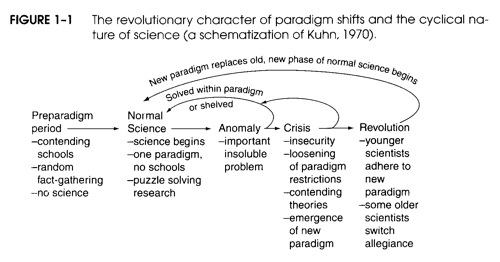Why governmental educational reforms fail.
 I’m sure that I’m not the only teacher sick of wave after wave of governmental reforms, tweaking and general tinkering about with the education system in the UK. We all know it needs changing, but it needs changing root and branch, not some remedial (and expensive) tree surgeon work!
I’m sure that I’m not the only teacher sick of wave after wave of governmental reforms, tweaking and general tinkering about with the education system in the UK. We all know it needs changing, but it needs changing root and branch, not some remedial (and expensive) tree surgeon work!
The trouble with tinkering is that it prolongs the problem and means that year after year of students entering school for the first time don’t start off on the right foot.
It hit me in the shower this morning that the model Thomas Kuhn set out in his seminal work The Structure of Scientific Revolutions applies here. For those (like me) who find diagrams easiest to understand, here’s one that gives an overview:
(source)

Think of Einsteinian physics replacing the previous model based on Newton’s work:
- Normal science – everything seems to work under Newtonian physics so people get on with ‘doing science’.
- Model drift – some anomalies mean that some ‘fiddling’ has to be done or scientists have to compensate for the shortcomings of Newtonian physics.
- Model crisis – there are now so many anomalies that it is interfering with ‘normal science’ taking place. This would happen at the atomic level with Newtonian physics.
- Model revolution – a time of great upheaval where scientists propose new theories and models to explain the phenomena. Think of the early 20th century when Einstein came up with his Theory of Special Relativity.
- Paradigm change – a model that explains the phenomena and allows science to move forward is settled upon and ‘normal science’ begins again.
I hope you can see already how this model pertains to educational reform. Although Kuhn’s model is of the order of a ‘grand narrative’ there is, I think, much explanatory power behind it.
If Kuhn’s model is applied to top-down government-funded educational reform then ‘normal education’ (akin to ‘normal science’) cannot progress. Teachers (akin to the scientists in the original model) have very little or no control over where their discipline is headed. There’s also the lack of an adequate feedback loop to explain the anomalies.
Finally, the clincher for me under this model is that governmental top-down reforms in education don’t take into account context. This is of fundamental importance and the biggest reason, to my mind, why such reforms fail. Using the Kuhnian model, the length of ‘normal education’, the number of anomalies, and the possible alternatives are dependant upon any number of local factors and features. In fact, not only is every Local Authority likely to be different, every school is likely to be different.
(read more on Kuhnian paradigm shifts here)
What are YOUR thoughts? Does the Kuhnian model work for you? :-p
(image credit: Failing Street by Chris Daniel @ Flickr)


